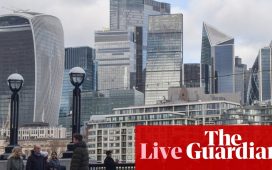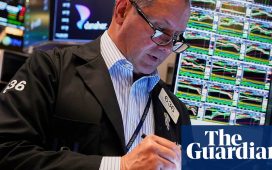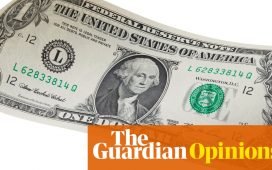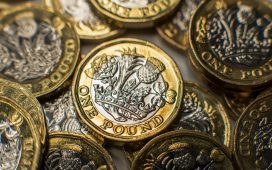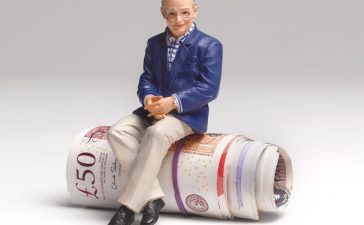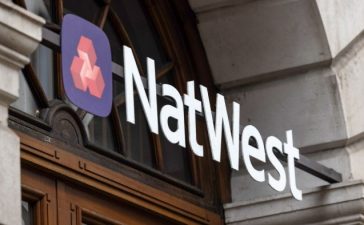Donald Trump may have stepped back from his huge tariff rises on every country, except China, which now faces 125%, but the impact of the market chaos is likely to continue in the UK and beyond. The rest of the world still faces a blanket 10% tariff on all US exports.
While much of the focus has been the direct impact of the tariffs on physical goods, Trump’s actions threaten to reach every corner of global finance and the economy.
Here, we examine the potential consequences of the tariffs and the fallout, from derailing deals and further undermining London’s stock exchange, to risking a rise in corruption and pushing up prices for consumers.
Falling global growth
The leading economic forecasters have yet to give their verdict, but the International Monetary Fund has already said the trade war will damage trade and business investment in most countries.
China could fail to meet its 5% growth target for 2025, while Germany could be pushed into recession. The UK is likely to escape relatively unscathed in terms of trade. UK goods exports to the US are significant, but businesses are expected to minimise the impact of tariffs, leading to a modest 0.1 percentage point reduction in UK GDP this year. However, with borrowing costs still high and consumer confidence at risk, the tariffs present a significant headache for Keir Starmer.
Soaring inflation and lower rates
Central banks have spent much of the past three years attempting to reduce inflation, which reached as high as 11% after Russia’s full-scale invasion of Ukraine in 2022.
Trump’s tariffs threaten to send costs for consumers surging. It is why the EU and the UK have proved reluctant to respond in kind to Washington’s barrage of tariffs.
Some estimates say US inflation – currently at 2.8% – could peak at 4.5% next year if tariffs remain in place and that the chances of a US recession have increased.
To tackle this, central banks across the UK and Europe are widely expected to cut rates soon to protect their economies. The US Federal Reserve has not signalled that interest rate cuts are on the way in the US, but it may be forced to if growth slows as anticipated.
Stock market listing delays
The City has been waiting patiently for a market rebound that would help unleash pent-up plans for floats by some of the UK’s biggest fintech firms, including neobanks such as Revolut, Monzo and Starling.
The fintech lobby group Innovate Finance even convened a “unicorn council” in 2024 that has been loosely referred to as a group of UK companies seen as IPO candidates.
The Swedish buy now, pay later giant Klarna’s $15bn New York float was seen as imminent, with the company widely expected to launch an investor roadshow this week. But as a result of the market turmoil it has failed to announce any further progress.
There are also questions about how long it may take for the China-founded, fast-fashion retailer Shein to charge ahead with plans for a controversial float on the London Stock Exchange. Shein reportedly filed papers with Britain’s markets regulator in early June last year, though a date for its potential float has yet to be set. The valuation of the float has reportedly been cut from the $64bn-plus it had previously hoped for.
Meanwhile, the Italian fashion group Prada has reportedly negotiated a discount of more than $200m (£156m) on the purchase of Versace in light of the trade war, the Financial Times reported.
Junk bonds
The US investment firm BlackRock has given junk bonds a clean bill of health, saying the loans made by companies that use them as a lifeline are not threatened by Trump’s tariffs.
A junk bond is a grade of loan that pays a high interest rate because ratings agencies consider them risky. The two largest department stores in the US, Saks and Neiman, came together at the end of 2024 in a buyout funded by a $2.2bn junk bond paying 11% interest. There are other retailers in the US that almost exist just to finance their loans.
However, choppy markets have left investors considering the implications of high tariff rates on deals in New York, freezing debt refinancing arrangements, Bloomberg reported.
after newsletter promotion
Deutsche Bank strategists said this week: “Credit volatility is back. Crippling policy uncertainty, haphazard tariff rate calculations, a partial loss of confidence in US institutional norms, and rising inflation are all notably increasing US risks.”
Thames Water debt refinancing
The UK’s biggest water supplier, which is struggling under a debt pile of close to £20bn, has selected the US private equity group KKR as a “preferred partner” as it seeks to secure fresh equity funding for its operations by the end of June, staving off nationalisation. It is understood the money is already in place. However, KKR’s investment committee has a veto and the deal could be scuppered if the tariff war triggers further turmoil on financial markets. That said, KKR was part of a consortium that reached a £1.6bn deal to buy the NHS landlord Assura on Wednesday.
Banks preparing for bad debts
Profits at banks across the world could take a hit, with tariffs affecting business borrowers and large corporate clients that sell products to the US.
It could dampen appetite for loans and weigh on demand for investment banking services, which help execute mergers and acquisitions, as well as fundraising through financial markets including IPOs.
But a drop in revenues could make it harder for companies to repay their debts. That could, in turn, force banks to start putting aside money for potential defaults in their first-quarter results, which are due later this month.
NatWest privatisation delayed
The government’s stake in NatWest Group – the bank formerly known as Royal Bank of Scotland – has been rapidly dwindling, having fallen to 3.95% at the end of March as the government took advantage of the lender’s strong share price.
It fuelled speculation that the bank could be weeks away from completely ditching its taxpayer-owned shares. However, market ructions caused by the tariff backlash have likely put a temporary pause on the state sell-down, as the government aims to recoup as much of its cash as possible.
The UK government originally spent £46bn bailing out RBS at the height of the financial crisis in 2008, leaving taxpayers owning about 84% of the lender. NatWest shares have struggled to return to the 500p paid by the government 17 years ago, but managed to hit 480p in early March.
Increased corruption
Mary Lovely, a trade expert at the Peterson Institute in Washington, has raised the prospect of widespread fraud at US ports and airports as customs officials wrestle with a complicated tariff regime affecting tens of thousands of imported goods.
The situation will get worse for border staff if Trump scraps the de-minimis rule that allowed goods valued at less than $800 to enter the US tariff free. There could be huge pressure on customs officials from importers to wave through shipments “for a fee” to escape high tariffs.

